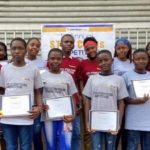Impact Stories from Economic Impact Policy Area

Fellow’s social impact initiative wins youth award
Fellow(s): Hiba Awaysa
Country: Palestinian Territories
Cohort: 2020-2021
Policy Area(s): Economic Impact, Education Diplomacy/Mentoring, Entrepreneurship, Professional Growth, Youth Engagement
This week it was announced that Sawaed19, the initiative founded by 2020-2021
fellow Hiba Awaysa, was named a winner of the Taawon Youth Award, an award
that supports social entrepreneurs in the Palestinian Territories that are creating
both economic and societal impact. Sawaed19 was one of five winners selected
out of over 100 projects.
Hiba established Sawaed19 in 2019 with a mission to match volunteers to nonprofits
around the world. The Sawaed19 website allows users to search by
location, industry and company, supporting them in contributing to the volunteer
ecosystem in their communities. Through Sawaed19, Hiba hopes to empower her
local community, particuarly youth, to create positive change. She will use the
award funds to further develop the platform, adding features that better
facilitates the volunteering process and management. She’ll also create a new
outreach campaign to encourage volunteering. “When you give others some
time, effort, or money to help them get better life, your are actually investing to
yourself in return,” she says.
Report Date...: 6/21/21

Fellow named Global Woman of Choice Award winner
Fellow(s): Ouafa Benterki
Country: Algeria
Cohort: 2012
Policy Area(s): Economic Impact, Empowering Women and Girls, Entrepreneurship, Professional Growth
2012 fellow Ouafa Benterki was recently named a Global Woman of
Choice Award winner, recognized for her contributions, accomplishments
and efforts to inspire the next generation. Ouafa is the founder and CEO
of MTY Intelligent Software as well as a Microsoft regional director.
The award is sponsored by She Leaps, an initiative that supports women
entrepreneurs through mentorship, networking and learning
opportunities. Ouafa was the winner in the Technology and Innovation
category, selected for creating high-impact and innovative solutions that
serve her community. This month, Ouafa was also featured by the U.S.
Embassy Algiers in an interview about her career and participation in the
TechWomen program. There, she also spoke about her role in the 2020-
2021 virtual program as a Peer Advisor, serving as an in-country support
system to the Emerging Leaders as they developed their action plan projects.
Report Date...: 6/7/21

AfriTech Hub hosts its inaugural STEM Club Competition
Fellow(s): Sabina Nforba
Country: Cameroon
Cohort: 2020-2021
Policy Area(s): Economic Impact, Education Diplomacy/Mentoring, Empowering Women and Girls, Entrepreneurship, Professional Growth, Youth Engagement
2020-2021 fellow Sabina Nforba organized the first STEM Club Competition hosted by her STEM education initiative, bringing together students to engage in technology and learn about STEM. Sabina is the co-founder and president of AfriTech Hub, an organization that empowers young students to pursue STEM education and STEM careers. AfriTech Hub has worked with over 3,000 students through its clubs, workshops and summits.
AfriTech Hub launched STEM clubs at the beginning of the academic year in schools throughout five cities in Cameroon. Despite setbacks, including the COVID-19 pandemic and a lack of resources, Sabina, in partnership with STEMpreneur, trained AfriTech Hub team members to serve as facilitators for the STEM clubs. “Like every leader faced with challenges, I knew that they were inevitable, and what makes people different is their attitude when faced with these challenges,” wrote Sabina. Last week’s STEM Club Competition convened student representatives from AfriTech Hub’s partner schools to congratulate them for their hard work and facilitate activities in video game development, animation, electronics and more. “The students, ever so enthusiastic, developed video games and build a traffic lights system and a lie detector machine using Arduino electronics,” wrote Sabina. “We are extremely proud of what these students have accomplished in the course of the year and during this event. The energy here was contagious.”
Report Date...: 5/31/21

With EduClick Careers fellow connects young people to jobs
Fellow(s): Angele Messa
Country: Cameroon
Cohort: 2019
Policy Area(s): Economic Impact, Education Diplomacy/Mentoring, Empowering Women and Girls, Entrepreneurship, Professional Growth, Youth Engagement
2019 fellow Angele Messa has launched EduClick Careers, a job
portal with a mission to help one million young people access
jobs and other opportunities by 2025. Angele is the founder of
EduClick, an EdTech platform that offers alternative learning
methods for those who don’t have access to formal education
in Cameroon. With both offline and online educational
methods, EduClick supports displaced people, recent graduates
and young professionals who are looking to gain marketable
skills.
In addition to listing the latest job opportunities and
scholarships for young people, EduClick Careers offers
resume/CV assistance, support creating a business plan and
tools to create an online presence. By offering a comprehensive search engine for young people, Angele hopes
to democratize job access, matching talent to opportunity regardless of geographic location and gender.
Report Date...: 5/17/21

Fellow will be first Egyptian instructor on LinkedIn Learning
Fellow(s): Nevien Magdy
Country: Egypt
Cohort: 2019
Policy Area(s): Economic Impact, Education Diplomacy/Mentoring, Entrepreneurship, Professional Growth
During TechWomen, fellow Nevien Magdy and the 2019 cohort had an opportunity to visit LinkedIn for Action Plan Workshop II, where they networked with LinkedIn employees, discussed social impact issues, received feedback on their action plans and spoke about how to use tech for good.
In 2020, Nevien saw a post on the TechWomen Alumnae Facebook group from LinkedIn Professional Mentor Jacqueline Barrett sharing a call-out for Africa-based instructors on LinkedIn Learning, LinkedIn’s platform that offers video courses taught by industry experts in the technology, creative and business fields. Nevien, the founder and CEO of UXit and Origin Technology Solutions, decided to apply, sending in her resume and sharing how she learned about the opportunity. After working with a production studio in Egypt to create an audition tape, Nevien was accepted as LinkedIn’s first LinkedIn Learning instructor from Egypt. “I was astonished,” said Nevien. “I didn’t expect to be accepted, but they said I was the fastest audition to be approved.”
This fall, Nevien will travel to the San Francisco Bay Area to LinkedIn’s studios to record a course on User Experience and how design leadership impacts the software industry; she expects the course to be published on the platform in 2022. “I would have never reached such an opportunity without being part of TechWomen,” she said.
Report Date...: 5/10/21

Fellow’s students present projects to King and Queen of Jordan
Fellow(s): Ala’a Agha Karss
Country: Jordan
Cohort: 2019
Policy Area(s): Economic Impact, Education Diplomacy/Mentoring, Empowering Women and Girls, Entrepreneurship, Professional Growth, Youth Engagement
In 2019, founder of Superiors Tech Hub and 2017 fellow Ala’a Agha Karss
collaborated with Princess Taghrid Institute for Development and Training
to design an immersive tech and business training for rural youth in
Jordan. For two months, Alaa’s project, “Productive Youth,” trained its 35
participants in design thinking, digital marketing, storytelling and more,
guiding them on how to create businesses for local and handmade
products.
Last month, Princess Taghrid Institute organized an exhibition to
showcase the students’ projects and products to King Abdullah II bin Al-
Hussein and Queen Rania Al-Abdullah. There, the King and Queen walked
through the exhibit, speaking to Alaa’s students about their training and
seeing their handicrafts and products on display. “I personally witnessed a
long journey for the students, a journey of self-development and creating
their products with unmatched determination,” said Ala’a.
Report Date...: 5/3/21

Fellow’s project AfChix expands reach with USAID funding
Fellow(s): Houda Chakiri
Country: Morocco
Cohort: 2012
Policy Area(s): Economic Impact, Education Diplomacy/Mentoring, Empowering Women and Girls, Entrepreneurship, Professional Growth, Youth Engagement
2012 fellow Houda Chakiri is a board member and project coordinator for AfChix, an initiative that addresses the digital gender divide through digital skills trainings, supporting women-led enterprises and advocating for digital inclusion. The initiative – already named a round one winner in 2018 – was recently named a round three winner of the Women Connect Challenge, a USAID-funded challenge that solicits global solutions that transform the ways women access and use technology.
Round three of the challenge, which focused on scale, replicability and private sector partnerships supporting emerging technologies, awarded four initiatives that are advancing women’s digital development. The AfChix project, “Scaling up Women-Led Community Networks for Women’s Prosperity,” will work with community networks in Kenya, Morocco, Namibia and Senegal to harness the power of digital technologies, partnerships and collaborations for the prosperity of women. “We will empower underserved women communities to use technology to improve their livelihoods and small businesses,” said Houda, who will work as Morocco’s project coordinator to identify and customize digital skills and literacy training programs for women. The digital training will be delivered via MOOCs (Massively Open Online Courses) in order to reach the most women in Africa, and will focus on using smartphones, digital marketing, working with online customers and more. “We hope to reach one million women aged 18 and above to strengthen their participation in the digital society,” says Houda.
Report Date...: 4/26/21

Mentor(s): Daniela Ushizima
Company: Lawrence Berkeley National Laboratory
Mentor Type: Professional
Policy Area(s): Economic Impact, Empowering Women and Girls, Professional Growth
TechWomen Professional Mentor Daniela Ushizima was recently one of 25 female scientists recognized by 3M, honored as a top 25 Women in Science in Latin America. Dani is a staff scientist at TechWomen host company Lawrence Berkeley National Laboratory, working in their Computational Research Division.
The first edition of the 3M initiative recognizes science leaders who are making a significant global impact through their innovative work. Dani, who represents Brazil, was selected out of 1,000 applicants for her work creating and developing efficient methods for cell analysis in detecting cervical cancer. Dani has worked alongside an interdisciplinary group of colleagues to create new tools for analyzing cervical cells using computer vision methods.
The 25 winners and their projects will be amplified on 3M’s platforms, and will gain access to coaching sessions, guest blog posts and other activities.
Report Date...: 4/26/21

Fellow wins first place at Ideathon for social impact
Fellow(s): Menna Ayad
Country: Egypt
Cohort: 2019
Policy Area(s): Economic Impact, Education Diplomacy/Mentoring, Entrepreneurship, Environmental Sustainability
This week, 2019 fellow Menna Ayad was named first place winner at Fekretek, a competition and platform for Egyptian women with business ideas that create impact and address the UN’s Sustainable Development Goals. Launched this year, the competition is sponsored by Vodafone Egypt in partnership with the National Council for Women, UN Women and the Ministry of Communications and Information Technology.
Menna, a network consulting engineer at Cisco, created Fosha, a mobile app that allows its users – both Egyptians and tourists – to discover Egypt in just a few clicks by accessing local tours, trips and activities. “Egypt relies heavily on tourism, and it got affected by the pandemic,” said Menna. “It is a critical time to introduce Fosha.” After Menna’s TechWomen mentorship at Twitter, she was inspired to find a way to use her background in computer science and app development. “At university, I fell in love with how a mobile app can reach millions of people and make their lives easier. During my mentorship at Twitter, I relived that passion again. It triggered my goal of creating a mobile app that can ease someone’s life.” Through Fosha, Menna hopes to digitally transform the tourism sector in Egypt and create a digital channel for service providers to market their offerings. As first place winner, she received a cash prize to kickstart her app, as well as access to entrepreneurship, marketing and finance training from the National Council for Women and UN Women.
Report Date...: 4/19/21

Fellow recognized for bringing free courses to Kyrgyz students
Fellow(s): Gulzire Minbaeva
Country: Kyrgyzstan
Cohort: 2018
Policy Area(s): Economic Impact, Education Diplomacy/Mentoring, Professional Growth, Youth Engagement
After visiting Khan Academy HQ during TechWomen 2018, fellow Gulzire Minbaeva maintained her connection with the academy’s internal communications officer, becoming an official language advocate for the academy when she returned home to Kyrgyzstan. Since then, Gulzire and her team of project managers, proofreaders, methodologists and over 200 volunteers have worked to translate Khan Academy courses, empowering students to reach their full potential by providing them with effective learning opportunities.
Gulzire, now the official representative of Khan Academy in Kyrgyzstan, was featured in an article this month from Limon.Kg, where she was interviewed about her work as an education advocate. “There is an acute shortage of resources in the Kyrgyz language in our country,” she said. “This became especially noticeable during the pandemic, when everyone switched to online learning.” Gulzire and her team have worked to translate 250 video courses to Kyrgyz, available for free to students throughout Kyrgyzstan. By September, she hopes to have published 2,000. “I want to revolutionize the education system of Kyrgyzstan,” she said.
Report Date...: 4/19/21

